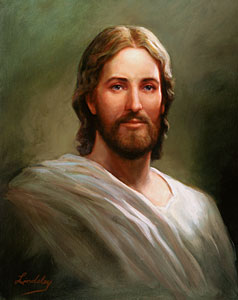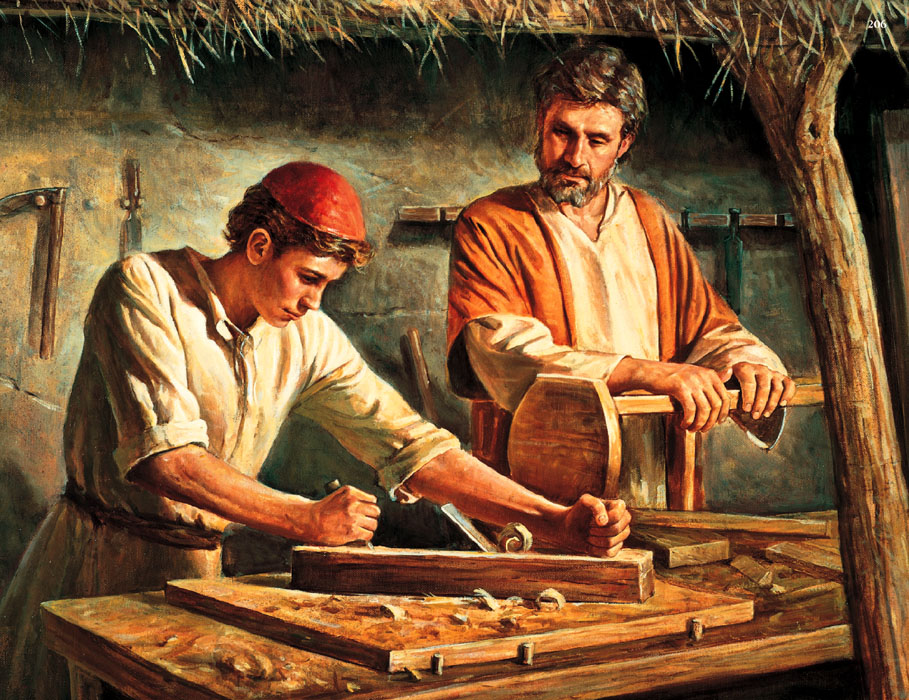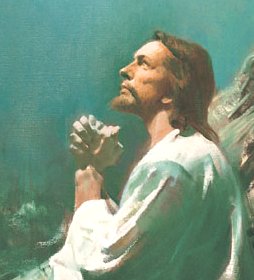|
|
|
|
 CHAPTER 14
CHAPTER 14
Isaiah speaks Messianically— |
 CHAPTER 53
CHAPTER 53

Isaiah speaks Messianically—Messiah's humiliation and suffering
set forth—He makes his soul an offering for sin and makes intercession for
transgressors— |
 |
|
1 YEA, even doth not Isaiah say: Who hath
abelieved our report, and to whom is the arm of the Lord
revealed?
2 For he shall grow up before him as a tender plant, and as a root out of dry grounda; he hath no form nor comeliness; and when we shall see him there is no beauty that we should desire him. 3 He is adespised and rejected of men; a man of sorrows, and acquainted with grief; and we hid as it were our faces from him; he was despised, and we esteemed him not. 1a arm of the LORD Isaiah 53 speaks from the perspective of the Father, Thus here the 'arm of the LORD' is He who the Father anointed to act in His stead in all things pertaining to this Second Estate. That is 'the arm of the Father' is the Son, Jesus Christ, the same who is Jehovah.
But the condescension of God is not found in that Christ was born as man, but rather in that particular mission that he was selected to perform. That is, as the creator of the Second Estate, and as the leading Firstborn and heir of the Father in the spririt, it was his responsibility to redeem that which he had created. The condescension of God was that he would take upon himself the sins of mankind, the sins of the Second Estate, the sins of all he had created and give himself to be an infinite, divine and eternal sacrifice for them. He not only fell as Adam and other had, but he descended below all things, to the very depths in order to perform his mission of redemption. He was not 'perfected' in the sense that the Father stood as a celestial being, but his redemptive power was that he was a guiltless, a sinless, an unspotted sacrifice for sin. He only was justified in and of himself for he had not sinned and come under the penalty of the justice of God. Yet he took upon himself the sins of all, suffering for all sin, a sinless sacrifice for sin, thus satisfying the justice of God, that we might be redeemed through him and cleansed of our carnal and natural man condition. He was the son of Mary which allowed him the ability to die a mortal death. He was the Only Begotten Son of the Father, which gaven him the ability to resurrect or live again, thus opening the way through his atonement, justifying all who would come unto him and receive of his grace and mercy unto salvation, that all might live again through him and be able to then be judged according to their works. |
1 ¶ WHO hath
abelieved our report? and to whom is the
arm of the LORDa revealed?
2 For he shall grow up before him as a tender aplant, and as a broot out of a cdry ground: he hath no form nor comelinessb; and when we shall see him, there is no dbeauty that we should desire him. 3 He is adespised and rejected of men; a man of bsorrows, and acquainted with grief: and we hid as it were our faces from hima; he was despised, and we cesteemed him not. 2a a tender plant, and as a root out of a dry ground The 'tender plant' is that 'rod', that 'stem', that 'stick', that staff which is planted in the ground, the dry ground, and which like the rod of Aaron does spring forth unto life which was a type, a foreshadow and a similitude of Jesus Christ. Such is the nature of certain plants, that a mere stick from the plant can be planted in the ground and again send out roots and grow. The North Carolina Poplar is such a tree as is the Plumeria of Hawaii. They will grow and bud forth as did the staff of Aaron, the life and power is in that rod that a tender plant doth bud forth and does grow into a tree of life. The 'dry ground' is that which is seemingly 'dead' and out of the 'Branch', the stem or root of Jesse and/or David does life spring forth. The royal House of David had seemed to have whethered away. The last of the House of David who was King of Judah was Zedekiah, but it was the son of Jehoiakim, Jehoiachin, who the Jews looked to, to be from whose descendants the Messiah would come, for presumeably all of the sons of Zedekiah had been killed by the Babylonians. Yet there was one prophecy which stated that there would be no more king out of David after Jehoiachin until the Messiah did come. Thus the House of David, the root thereof was from that of 'dry ground'. Now the 'tender plant' or 'shoot' or 'rod' which did grow out of that root, rod, stem or branch was Jesus Christ. This is the descendant of Jesse, that 'rod' out of the 'stem of Jesse' which is spoken of in Isaiah 11 and D&C 113. This is of course Jesus Christ, the Son of God. And as D&C 113:4 so states, he is partly a descendant of Jesse as well as of Ephriam, or the house of Joseph (See Messiah ben David ~ Messiah ben Joseph).  3a hid as it were our faces from him During the last months of the Savior's ministry many of his follwers, his disciples who had followed Jesus for a time, left Him as he began to declare himself unto them. Matt. 26:56. |
1a
John 12:38;
Rom. 10:16; Mosiah 14:1 (1-12) 1a Isa. 53:1-12 2a Ps. 110:2 b Rev. 22:16 c TG Jesus Christ, Condescension d HEB it is not for his appearance appeared as man, not of glory 3a Ps. 22:6; Mark 9:12; 1 Pet. 2:23 (13-25); TG Malice b TG Sorrow b Matt. 9:11 (10-13); John 1:10; TG Respect 3a Ps. 22:6; 1 Ne. 19:14
|
4 Surely he has aborne our
bgriefs, and carried our sorrows; yet we did esteem him
stricken, smitten of God, and afflicted.
 6 All we, like asheep, have gone astraya; we have turned every one to his own way; and the Lord hath laid on him the iniquities of us all. 6a All we, like sheep, have gone astray; we have turned every one to his own way The words which are made a part of Handel's Messiah, are these which sets forth the manner of carnal man. That the natural man is lead by the weaknesses of the flesh. All are subject to sin and the frailties of the wretched carnal corruptable man of this temporal existance. And only those who do come unto the Lord and does repents, putting off this nature or the natural man, submitting one's self unto the spirit, to be led there by in the ways of righteousness, are those to whom salvation doeth come. |
.4
¶ Surely he hath aborne our bgriefs,
and carried our sorrows: yet we did esteem him stricken, smitten of God, and
afflicted.
 .6 All we like asheep have gone bastray; we have turned every one to his cown way; and the LORD hath laid on him the diniquity of us all.
|
4a
Isa. 50:6;
Philip. 2:7 (5-8) b TG Compassion; TG Jesus Christ, Redeemer 4a Alma 7:11 b Matt. 8:17 5a TG Jesus Christ, Mission of; TG Jesus Christ, Prophecies about; TG Salvation, Plan of b Rom. 4:25; TG Redemption; TG Transgression; c 1 Pet. 2:24-25 d TG Remission of Sins 5a TG Jesus Christ, Crucifixion of b Mosiah 15:9; Alma 11:40 c 1 Pet. 2:24-25 6a TG Sheep b Prov. 21:16; 2 Pet. 2:15 (12-15) c 2 Ne. 12:5; D&C 1:16; TG Selfishness d 2 Cor. 5:21; TG Jesus Christ, Atonement through; TG Sin 6a Matt. 9:36; 2 Ne. 12:5; 2 Ne. 28:14; Alma 5:37
|
|
7 He was oppressed, and he was afflicted, yet he
aopened not his mouth; he is brought as a
blamb to the slaughter, and as a sheep before her shearers
is dumb so he opened not his mouth.
8 He was taken from prison and from judgment; and who shall declare his generation? For he was cut off out of the land of the living; for the transgressions of my people was he stricken. 9 And he made his grave with the wicked, and with the arich in his death; because he had done no bevil, neither was any deceit in his mouth.
|
7
He was aoppressed, and he was bafflicted,
yet he copened not his mouth: he is brought as a
dlamb to the eslaughter, and as a sheep
before her shearers is dumb, so he openeth not his mouth.
.8 He was taken from prison and from judgment: and who shall declare his ageneration? for he was cut off out of the land of the living: for the btransgression of my people was he stricken. .9 And he made his grave with the awicked, and with the rich in his bdeath; cbecause he had done no dviolence, neither was any edeceit in his mouth.
|
7a
TG
Oppression b TG Affliction c Mark 14:61; Mark 15:3 (2-14) d Gen. 22:8-14; Jer. 11:19; Mosiah 14:7 (6-8); D&C 135:4; TG Jesus Christ, Lamb of God; TG Jesus Christ, Trials of e TG Persecution; 7a Isa. 53:7-8; Mark 15:3 (2-14); John 19:9-10; 1 Pet. 2:23 (22-23); Mosiah 15:6; TG Jesus Christ, Trials of b Jer. 11:19; TG Passover 8a Mosaih 15:10 b TG Remission of Sins; TG Transgression 9a Luke 23:32-33 b TG Jesus Christ, Death of c OR although d 1 Pet. 2:22 e TG Deceit; TG Guile; TG Honesty 9a Matt. 27:57-60; Mark 15:46 (27, 43-46); TG Jesus Christ, Death of b John 19:4
|
|
10 Yet it pleased the Lord to abruise him; he hath
put him to grief; when thou shalt make his soul an offering for sin he shall
see his bseed, he shall prolong his days, and the pleasure
of the Lord shall prosper in his hand.
11 He shall see the travail of his soul, and shall be satisfied; by his knowledge shall my righteous servant justify many; for he shall abear their iniquities. 12 Therefore will I adivide him a portion with the agreat, and bhe shall divide the spoil with the strong; because he hath poured out his soul unto death; and he was numbered with the transgressors; and he bore the sins of many, and made cintercession for the transgressors.
|
.10
¶ Yet it pleased the LORD to abruise him; he hath put
him to grief: when thou shalt make his soul an boffering
for sin, he shall see his cseed, he shall prolong his days,
and the dpleasure of the LORD shall prosper in his hand.
.11 He shall see of the travail of his soul, and shall be satisfied: by his aknowledge shall my righteous bservant cjustify many; for he shall dbear their iniquities. .12 Therefore will I divide him a portion with the great, and he shall divide the spoil with the strong; because he hath poured out his soul unto adeath: and he was numbered with the btransgressors; and he bare the sin of many, and made cintercession for the transgressors.
|
10a
Gen. 3:15 b TG Self-sacrifice c Mosiah 15:10 (5-13); TG Sons and Daughters of God d TG Pleasure 10a Zech. 3:7 (all) [See Commentary] 10a Gen. 3:15; Rom. 16:20 b Mosiah 15:10-13 11a TG Knowledge b TG Servants c TG Justification d TG Accountability 11a Lev. 16:22 (21-22); 1 Pet. 3:18; D&C 19:16-19 12a TG Jesus Christ, Crucifixion of; TG Jesus Christ, Death of; TG Martyrdom b Mark 15:28; Luke 22:37 c Rom. 8:34 12a Luke 24:26 b Mosiah 15:12 c 2 Ne. 2:9; Mosiah 15:8; Moro. 7:28 (27-28)
|
| This BM Book | Previous BM Chapter | Next BM Chapter | Commentary Page | Home Page |